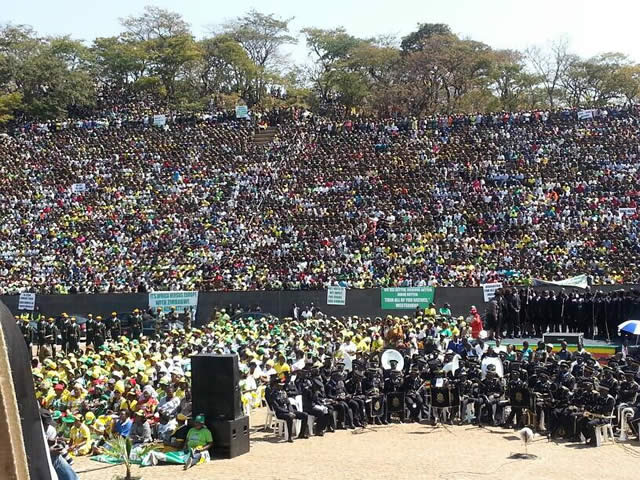When lakes become crossing points
Perspective Stephen Mpofu
“What was once a lake is now a crossing point.” Abridged though this African proverb-cum-metaphor might be, yet it nevertheless still captures an imperative need for Zimbabwe, once a surplus maize food producer and exporter — but now an importer of the staple diet — to reverse the existing riches-to-rags bromide so that our people may go full steam ahead with implementing the Zimbabwe Agenda for Sustainable Socio-Economic Transformation with their bellies full.
It is an incontrovertible truth that hungry people, as are to be found in drought hit parts of Zimbabwe today, are wont to be angry people and, when one is consumed with anger one is also likely to become blind to, and not even support, those positive social, economic or political government initiatives meant to better the welfare of the person in point.
Climate change caused by global warming and with concomitant, perennial droughts — and floods in other countries — has also dethroned Zimbabwe’s pride as the breadbasket of Southern Africa.
Yet all hope for the revival of agriculture as the principal mainstay of this country’s economy is not completely lost given assistance from a friendly country, Brazil, to mitigate the ugly effects of climate change. This is in reference to state-of-the-art equipment worth millions of dollars supplied to Zimbabwe by that friendly South American country under its More Food for Africa Programme that President Mugabe inaugurated recently to try to put Zimbabwe back on track in its agricultural revolution.
Comprising 40 tractors, 25 disc ploughs, 33 planters, 33 rom discs, seven fertilizer spreaders and 512 knapsack sprayers each — the equipment will be used at irrigation schemes to boost food production at household level and food security for the nation.
Already drought-prone districts in the Midlands province have benefited from the equipment allocated to irrigation schemes there to give the villagers a brave new start in food production, with other drier parts of the country lining up for the same assistance in due course.
It is all very well to receive the much needed equipment to enable our people to adapt to capricious new climatic conditions, but the funfare might not last long if due care is not given to both the equipment from Brazil and to the irrigation schemes themselves, bearing in mind that many of the latter facilities introduced years ago went defunct and there have been calls for their revival in face of droughts that have ravaged crops and pastures alike in some parts of the country.
Strict monitoring of the new equipment is therefore necessary to ensure that none of it, tractors, for example, is used by villagers as taxis to ferry people from one point to another for a fee and that all of the equipment is kept in tiptop working condition.
In addition, the powers that be might wish to consider a deployment of agricultural experts to ensure that all the equipment is put to full productive use for the benefit of families and finally of that of the nation as a whole to forestall a beggar syndrome that potentially makes a laughing stock of a people, such as Zimbabweans, with a renowned productive capacity.
Thousands of workers — and also breadwinners for thousands more people — have been sacked recently under a Supreme Court ruling with little or no prospect for any job coming their way while illegal Western sanctions remain in force and crippling industrial operations and with liquidity a far cry, the employees who suddenly found themselves in the cold are likely to throng urban streets as informal traders, thereby making nonsense of government’s moves to decongest city streets by relocating the merchants to designated sites away from CBDs.
And — who knows — others might resort to unorthodox means of earning a living and find themselves at loggerheads with the laws of the land. Or they might in desperation try to seek their new fortunes over the border but become expelled by those countries and come back here to live as paupers, thus aggravating their poverty as well as their families’ want.
Under the circumstances, should government not speed up the subdivisions of huge farms owned by individuals in order for those workers who lost their jobs to be resettled on the land parcelled out where they are likely to demonstrate their mettle as conscientious producers to shame their former employers?
Moreover, those Zimbabweans who have decided to ply their trade on the land as cattle ranchers or food producers have it on record that life out there can be more profitable and enjoyable than that under formal employment in town and for a measly wage.
The armed revolution that restored the land to its rightful owners will certainly have been in vain if our people shun the soil, not wanting to display calloused hands out of which flow wealth and pride for Zimbabweans as an independent and sovereign people.











Comments